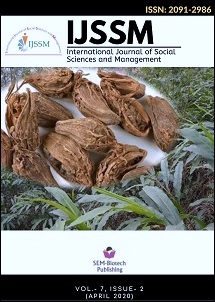Public Expenditure on Primary Education: A Study of Gorkha District, Nepal
DOI:
https://doi.org/10.3126/ijssm.v7i2.28594Keywords:
Education, public expenditure, household income, government budget, positive impactAbstract
The Nepalese education system is more competitive and harmonious although for the lack of funds and resources. The present education system is still in the transition phase. The study has focused on the impact of public expenditure on primary education and try to show how there is increasing government involvement and how it has continued with the rising educational expenditure. The focus of the objective of this article is to show the importance of public expenditure on primary education in the context of Nepal in Gorkha district. The data gathering tool used is secondary methods from the publication of the ‘financial and educational structure of Gorkha’ and 60 households has been taken. A structural simple statistical method is used in which objectives are well defined and aimed at a specific type of information. Government budget on primary education is taken as dependent variable and income as an independent variable in this study. This research article concludes that the government contribution to primary education is tremendously significant in the development of education in Nepal. To reduce the imbalance, education should provide more incentive to people for educational development.
Int. J. Soc. Sc. Manage. Vol. 7, Issue-2: 86-93
Downloads
Downloads
Published
How to Cite
Issue
Section
License
This license enables reusers to distribute, remix, adapt, and build upon the material in any medium or format for noncommercial purposes only, and only so long as attribution is given to the creator.




